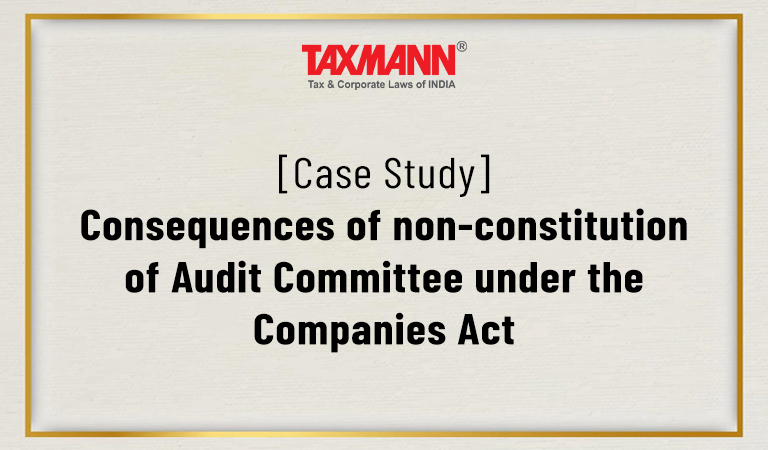[Case Study] Consequences of non-constitution of Audit Committee under the Companies Act
- News|Blog|Company Law|
- 2 Min Read
- By Taxmann
- |
- Last Updated on 21 November, 2022

[2022] 145 taxmann.com 65 (Article)
1. Audit Committee
As per the provisions of section 177 of the Companies Act 2013 read with rule 6 of the Companies (Meetings of the Board and is Powers) Rules, 2014 the board of directors of every listed company and the other specified classes of companies is required to constitute a Audit Committee of the board. The Audit Committee is one of the main pillars of the corporate governance mechanism in any company and the Audit Committee overseas the company’s of financial reporting and disclosure and the Audit Committee aims to enhance the confidence in the integrity of the company’s financial reporting, the internal control processes and procedures and the risk management systems. Under the Companies Act, 2013 the Audit Committee’s mandate is significantly different from what was it earlier and the Audit Committee’s scope and constitution have also been broadened to a greater extent. In addition to the Companies Act provisions, the listed companies are also additionally governed by the Regulation 18 of the SEBI (Listing Obligations and Disclosure Requirements) Rules 2015 relating to Audit Committee.
2. Relevant provision on constitution of Audit Committee under Companies Act 2013
Sub-section (1) of section 177 of the Companies Act 2013, provides that the board of directors of every listed public company and such other class or classes of companies, as may be prescribed, shall constitute and Audit Committee.
The Audit Committee shall consist of a minimum of three directors with independent directors forming a majority;
3. Penal provisions for non-compliance/default
In terms of the provisions of Sub-section (8) of section 178 read with the Companies (Amendment) Act, 2020 Notification dated 28th September 2020 Amendment. effective from 21st December 2020
“In case of any contravention of the provision of section 177, the company shall be liable to a penalty of five lakh rupees and every officer of the company who is in default shall be liable to a penalty of one lakh rupees”.
4. Consequences of default/violation – action from the Regulator
To understand the consequences of any default in complying with the constitution of the Audit Committee under section 177 of the Companies Act 2013, let us go through one of the decided case law on this matter on 18th February 2022 by the Registrar of Companies of Pune of Maharashtra state.
5. The relevant case law on this matter
We shall go through a case relating an adjudication order passed by the Registrar of Companies, Pune of Maharashtra on 18th February 2022, in the matter of Precision Automation and Robotics Private Limited bearing order no. RoCP/ADJ/order/177/21-22/PARI/ 2068 on adjudication of penalty under section 454(3) of the Companies Act 2013 read with rule 3 of the companies (adjudication of penalties) Rules, 2014 for violation of section 177 of the Companies Act, 2013.
Click Here To Read The Full Article
Disclaimer: The content/information published on the website is only for general information of the user and shall not be construed as legal advice. While the Taxmann has exercised reasonable efforts to ensure the veracity of information/content published, Taxmann shall be under no liability in any manner whatsoever for incorrect information, if any.

Taxmann Publications has a dedicated in-house Research & Editorial Team. This team consists of a team of Chartered Accountants, Company Secretaries, and Lawyers. This team works under the guidance and supervision of editor-in-chief Mr Rakesh Bhargava.
The Research and Editorial Team is responsible for developing reliable and accurate content for the readers. The team follows the six-sigma approach to achieve the benchmark of zero error in its publications and research platforms. The team ensures that the following publication guidelines are thoroughly followed while developing the content:
- The statutory material is obtained only from the authorized and reliable sources
- All the latest developments in the judicial and legislative fields are covered
- Prepare the analytical write-ups on current, controversial, and important issues to help the readers to understand the concept and its implications
- Every content published by Taxmann is complete, accurate and lucid
- All evidence-based statements are supported with proper reference to Section, Circular No., Notification No. or citations
- The golden rules of grammar, style and consistency are thoroughly followed
- Font and size that’s easy to read and remain consistent across all imprint and digital publications are applied



 CA | CS | CMA
CA | CS | CMA
